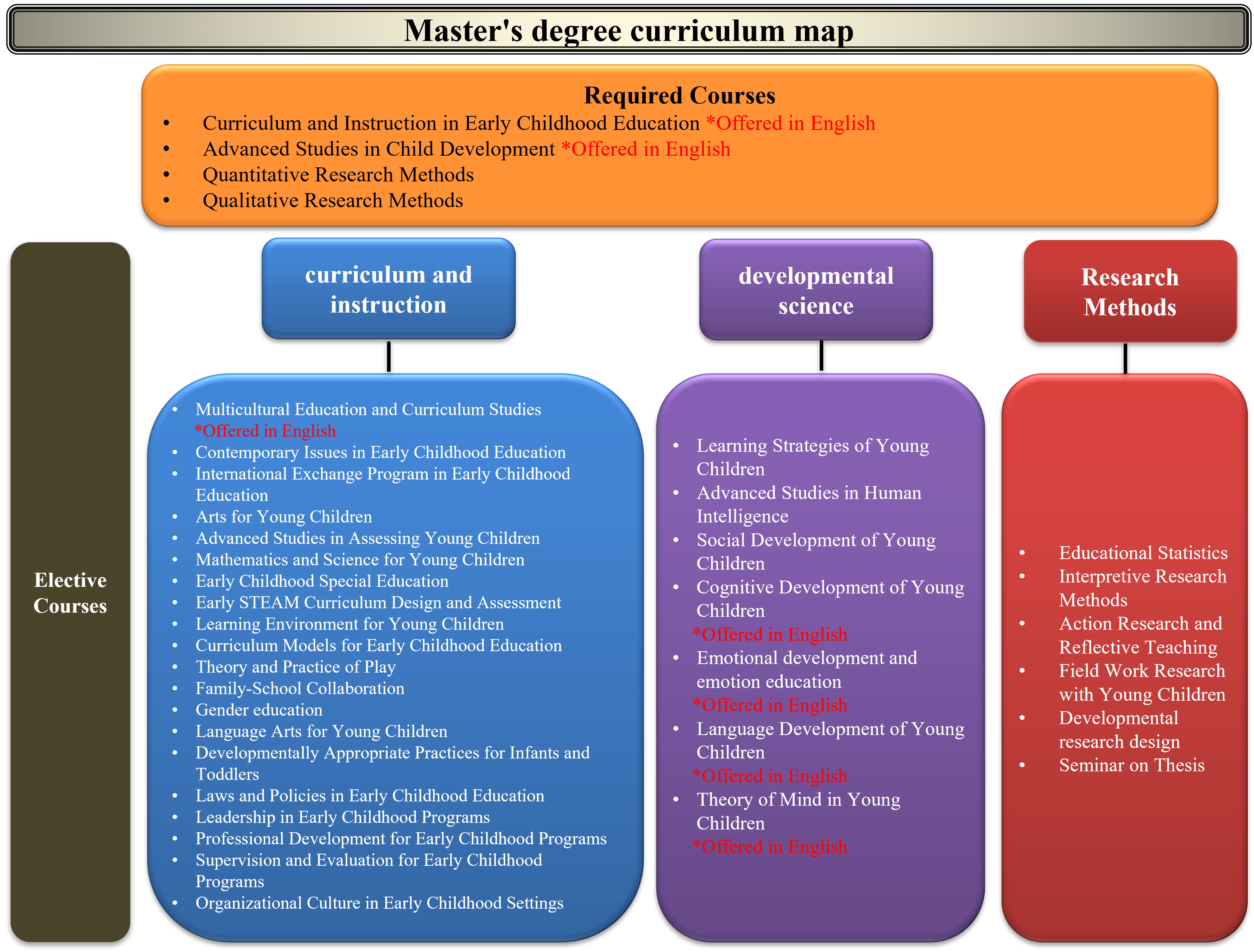Master's Program
【Objectives of the Master’s Program】
The main goal of the master's program in our department is to cultivate next-generation leaders in early childhood education research and practice. The specific program objectives include:
1. Cultivating early childhood education research skills;
2. Increasing the ability to integrate early childhood education-related theories into practice;
3. Cultivating the ability to attend to and critically think about early childhood education issues.
【Directions of development of the Master's program】
Our program aims to cultivate researchers and professionals in two areas of specialization of early childhood education: "Curriculum and Instruction" and "Developmental Science”. We focus on strengthening four dimensions: teaching, research, knowledge utilization, and technology application. The goals of each of the four dimensions are described as follows:
A. Goals of teaching
1. Establishing an unique expertise in "early childhood education curricula and teaching"
2. Strengthening "locally rooted" early childhood education curricula
3. Valuing and promoting diversity
4. Emphasizing the integration of theory and practice
B. Goals of research
1. Strengthening our locally oriented research
2. Expanding cross-strait cooperation on early childhood education research
3. Broadening an international perspective in research
C. Knowledge utilization
1. Promoting international academic exchanges
(1) Organizing international academic seminars
(2) Encouraging the faculty to participate in international academic seminars domestically and abroad
2. Establishing professional consulting roles and mechanisms
(1) Integrating early childhood education theory and practice and providing kindergartens guidance and consultation
(2) Establishing long-term partnerships with high-quality kindergartens, and establishing a mechanism to promote professional developments of kindergartens,
to increase the quality of early childhood education, and to expand research fields for the faculty and students in the department
D. Goals of technology application
1. Applying various technologies and media to enhance the effectiveness of teaching, research, and coaching
2. Developing E-courses
【Competency indicators and course objectives of each specialization in the Master's program】
- Curriculum and Instruction specialization
A.Course objectives
1. Cultivating early childhood education research skills
2. Increasing the ability to integrate early childhood education-related theories into practice
3. Cultivating the ability to attend to and critically think about early childhood education issues
B. Competency indicators
1. Early childhood education research skills: Ability to write about and conduct early childhood education-related research, including writing research plans, collecting and analyzing research data, writing research reports, and publishing research results.
2. Integration of early childhood education theory and practice: Ability to apply theories about child development and curriculum and teaching to early childhood education practices and settings.
3. Care about the ecology of early childhood education: Ability to care about and discuss current issues related to the domestic ecology of early childhood education.
4. Critical thinking on early childhood education issues: Ability to think critically and respond to major early childhood education issues.
5. Leadership and communication skills: Ability to apply leadership skills such as communication, coordination and cooperation to early childhood education settings to achieve real impact.
- Developmental Sciences specialization
1. Establishing a more comprehensive understanding of the contexts and patterns of child development through the integration of cross-disciplinary knowledge.
2. Exploring the various processes and changes in child development, from biological, psychological, and social perspectives, and through qualitative and quantitative research methods.
3. Conducting research on cognitive processes in infants and young children through brain science technologies and instruments .
4. Providing evidence-based knowledge to families, schools, and the society to enhance the development and wellbeing of infants and young children with diverse needs.
【Students’ future development】
Students from our Master's program have diverse career paths after graduation, such as full- or part-time lecturers in colleges and universities; kindergarten principals, directors, and teachers; researchers; professionals in related industries; or passing national examinations to serve in the Ministry of Education and municipal education bureaus. Among the graduates from our Master’s program who are interested in scientific research, many have also continued to pursue a doctoral degree domestically or abroad.
【Master's degree curriculum map】

【Research Expertise and Website of Faculty Members】
It is recommended to contact potential advisor(s) prior to the application. Interviews via phone or video call may be arranged when necessary.
|
Potential Advisor |
Research expertise |
Phone |
|
Website |
|
Hsin, Ching-Ting /Professor & Chair |
Early STEM Education Sociocultural Approaches to Literacies Culturally Sustaining Early Indigenous Languages and STEM Curricula Multicultural Education Qualitative Research Methods |
03-5715131#73225 |
Lab: |
|
|
Hsieh, Ming-Fang /Professor |
Early Childhood Language and Literacy Education |
03-5715131#73224 |
Webpage: https://gdece.site.nthu.edu.tw/p/404-1587-262307.php?Lang=zh-tw |
|
|
Tsao, Ya-Lun /Assistant Professor |
Children's Games Early Childhood Education Curriculum and Teaching Early Therapy Preschool Special Education |
03-5715131#73215 |
Webpage:https://gdece.site.nthu.edu.tw/p/404-1587-262324.php?Lang=zh-tw |
|
|
Chang, Wan-Chen /Assistant Professor |
Early Childhood Literacy Development Kindergarten Curriculum and Teaching Reading Comprehension Research |
03-5715131#73223 |
Webpage: https://gdece.site.nthu.edu.tw/p/404-1587-262325.php?Lang=zh-tw |
|
|
Tsou, Yung-Ting /Assistant Professor |
Emotional Development Social Participation and Peer Interaction Eye Tracking Sensing Technologies Instrument Validation Multilevel Modeling |
03-5715131#73220 |
Webpage: https://gdece.site.nthu.edu.tw/p/404-1587-272325.php?Lang=zh-tw |
